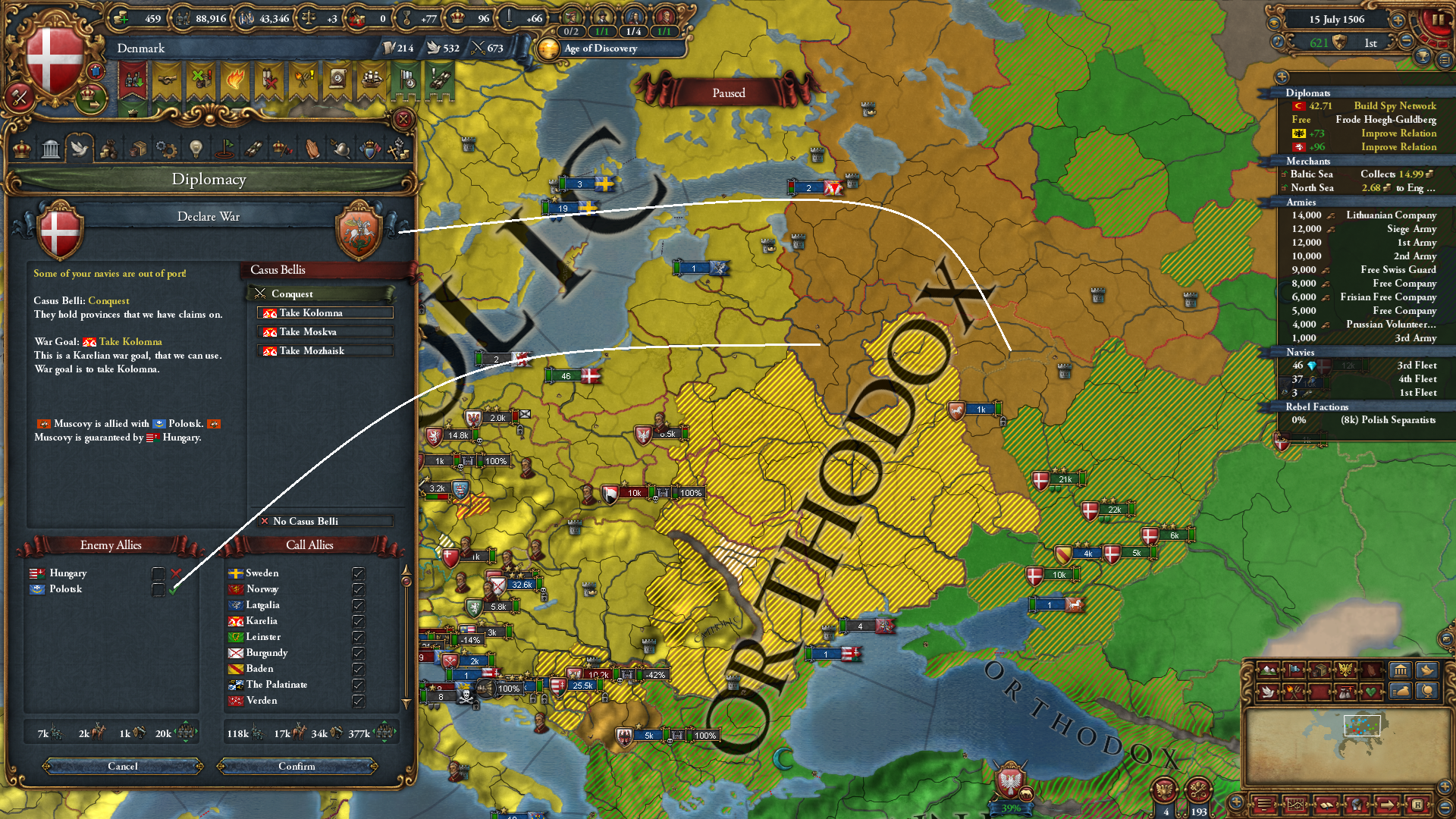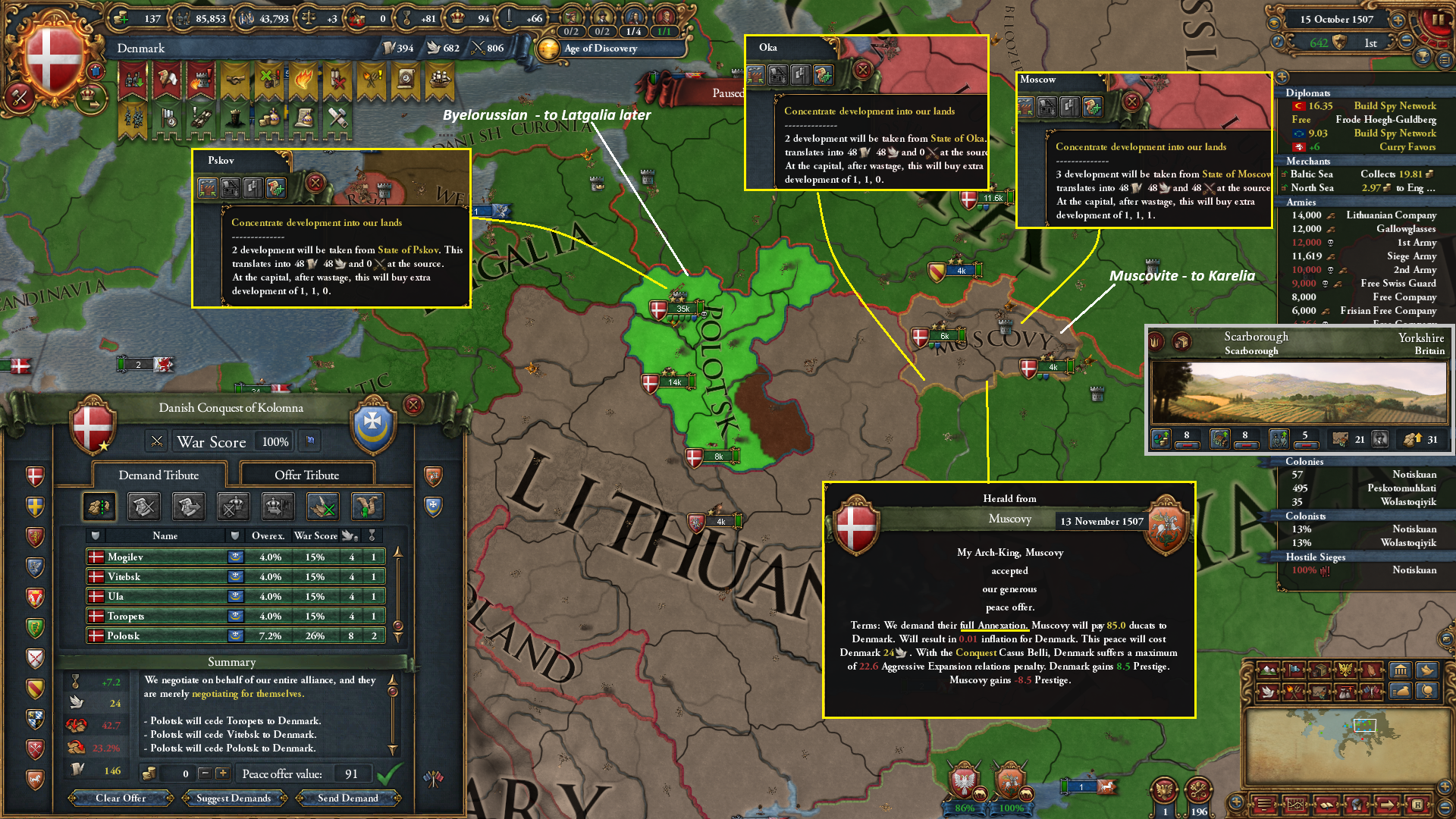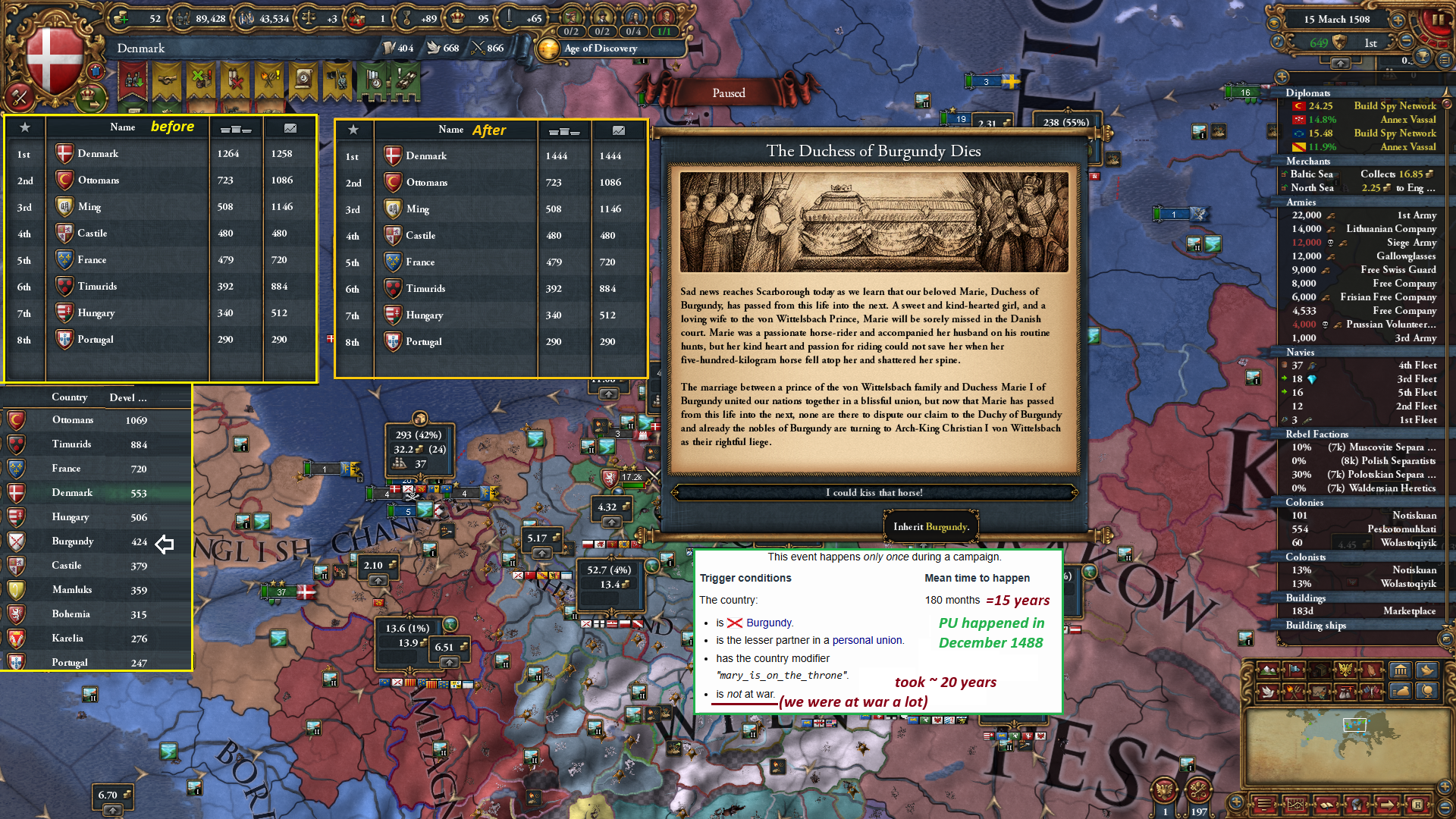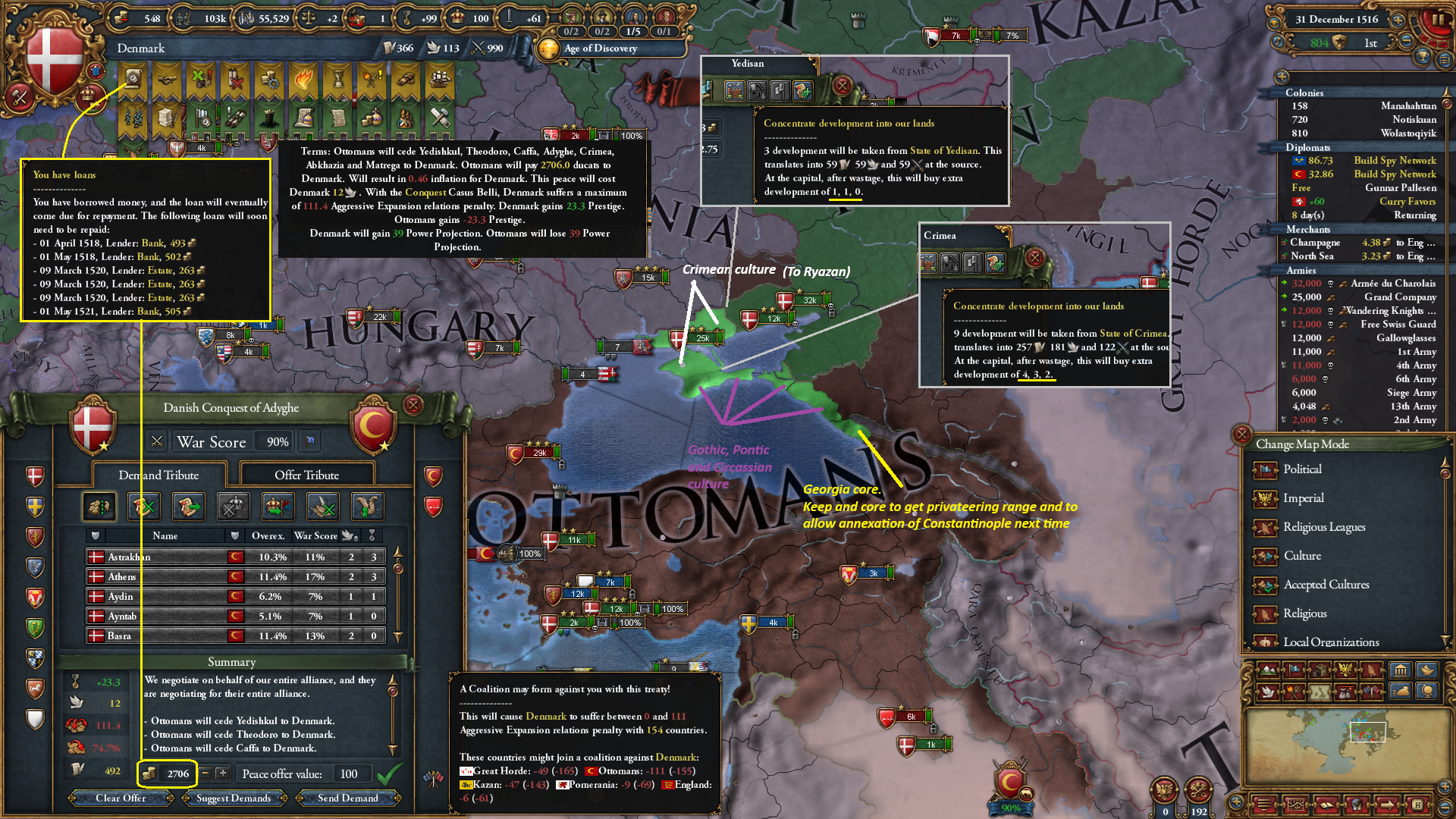Chapter 8: Long Lives The Emperor (1510-1520)
(note: title
is grammatically correct)
The highlight of the last Chapter was the incorporation of the Burgundian Low Countries into Denmark proper. As a result, Denmark had significant government capacity shortage and wars in Europe were being avoided until that got resolved by the construction of Courthouses. But war with American Natives, where aggressive expansion did not matter much as they were weak, continued. But the first notable event of the new decade was the conclusion of the Bohemian war on Poland ended with a resounding Bohemian victory

The Bohemian King became ruler of Poland *and* Lithuania as well, with the Lithuanians being already loyal to him . This news was viewed with cautious optimist in Denmark, were the secret project of gaining the Tiple BPL Crown was being pursued, and with a diplomat already at work currying favors in Prague. And the reason we say "cautious" is that Bohemia could become a potential rival to Denmark with such power at her disposal, with a potential clash over the Baltic coastline. But with a royal marriage, alliance and improved relations the Bohemia opinion of Denmark was still quite positive.
More important international news followed on the heels of this event with a declaration of war by the Ottomans against Venice and Castile who was defender of the Catholic faith.
The Arch-King saw this as an opportunity for another war against the Ottomans, but first he needed to do some internal house-keeping that required Denmark to be at peace. So he ordered the war in America to be hurried up. And then he had to mourn the passing of his beloved Queen Margarete , just as news reached him that his Norwegian subjects had been successfully colonizing in South America.
He then managed passage of the Elite Mercenary government reform, favoring it over the General Commissariat preferred by the Prussian nobility ( while our Arch King adopted Prussian culture, he had no intention of becoming a Prussian militarized state as that would destroy the unique Kalmar Union government he had worked so hard to ratify ) .
The focus on mercenaries, coupled with previous missions focusing also on mercenaries and the Danish national idea of "the King's Army" meant he could recruit mercenary companies at a steep discount ( although, temporarily , mercenary maintenance costs was high due to unfortunate events that we did not detail earlier) .
While all these internal things were taken care of, the Arch King was closely paying attention to the completion of Denmark's first colony in the new World, in a province with an unpronounceable native name (Peskotomuhkati) . That province was promptly renamed to the easier Margreta in honor of the late Queen .
And the importance of Margreta becoming a city was the ability to annex 3 coastal provinces from the Penobscot and their allies , cities that were otherwise too far from Denmark's core provinces. That quickly raised the total number of provinces in the New World to 4 ( of course the new provinces had to be cored first, but that was much faster than settling a new colony).

The Arch King annexed all 3 in one peace treaty to save on envoy travel time, given distances to the New World . You see, Christian was eager to have Denmark at peace because it was time to move the capital again as he was sitting on a lot of administrative power, and he was about to embark on a possibly long war with Ottomans. The main reason to move the capital was that Scarborough has grown a lot and pillaging was becoming unprofitable again. But he also heard rumblings that Dutch people were going to rebel in the future if they were ruled by someone who was not Dutch, unless the capital was in Dutch land. And since his heir Christian was not known for his administrative skills, the Arch King thought doing the move now was better than leaving it for later, when administrative power may be in short supply.

After surveying all the Low Countries, he settled on Zeeland as a province that was currently small in size, but could be grown due to its grassland topography, and was not on the border. And so at the exorbitant cost of 385 administrative power, he moved the Capital for the last time in his reign ( making a full circle from Danish Zealand to Dutch Zealand) . And of course, prior to moving the Capital to Zeeland, he had to remove it from the Holy Roman Empire . But since he did not care what the Austrians thought, he went ahead and removed all other HRE provinces as well.
Our energetic King was then preparing for war against the Turks, when a Leinster diplomatic party arrived in the new capital with a royal marriage proposal, presumably to betroth young prince Frederik to one of their own. But the Arch King took a fancy to young princess Siofra Tudor, and took her for himself, ending his widower status . Margrete was now just a memory ( at least she got a province named after her in America!).
Our indefatigable King celebrated his nuptials with a declaration of war on the Ottoman Sultan , just as the latter's armies had reached the border of Venice.
For the war, Denmark called on her faithful ally Hungary who gladly obliged, not realizing that the brunt of the fighting would happen on their land given the location of the Turkish hosts. But the war actually started badly for the Danes, as they tried to lift the siege of Giurgi in Wallachia, only to be surprised ( again) by a lurking Ottoman army
The Danes had to withdraw, allowing the Ottomans to invade Hungary proper. But the allies did better on teh Eastern front, winning at Abkhazia and Adyghe.
And the Arch King thought about diverting armies from that front to help the beleaguered Hungarians, but then the Hungarians did something that pissed him off:
They kept the occupation of Crimea after that fortified city fell. Even though it was Danish artillery and siege generalship that hastened the fall of the city . This was very aggravating, because Crimea was the main province he was after , hoping to annex it to Ryazan ( who now accepted Crimean culture). Having it in Hungarian hands was unacceptable. And so Christian decided to leave the Hungarians to face the Ottomans with minimal assistance only, hoping they exit the war in a separate peace to allow Denmark to take Crimea again. And instead ordered the armies to push deeper into Anatolia.
Meanwhile he was having a good time with young princess Siofra who bore him another child, proving he still got it at 63. Also, thanks to his military skills, Danish siege armies were barraging all Turkish forts, swiftly advancing towards the Bosporus from the East.
The Danes reached the eastern side of Marmara in Spring 1514. But that news was overshadowed by the first crack in the monolithic Catholic block that was Europe.
The tiny free state of Ulm had gone Protestant, stopped recognizing Papal Authority, and became a center to spread the new Protestant faith in South Germany . The Arch-King followed that with interest, wondering who else may soon join Ulm ( Denmark, being at war, did not have a choice ). And he actually ended up waiting a while before that happened. And so the more important news for Denmark was the ascension of a new King of Bohemia, Otakar I Kinsy, who managed to retain the Crowns of Poland and Lithuania.
The new King did not have any heirs. The possibility that a Wittlesbach could be made into an heir was pursued, but alas Denmark did not have enough favors with the court in Prague to make that happen . Meanwhile, the Ottomans carried a counteroffensive against Danish armies in Anatolia, managing to defeat them at Karasi.
The Ottomans followed that by signing a separate peace with Venice, freeing up their troops in the Balkans. They then quickly wheeled those troops around and defeated the Hungarian army at Vidin. Meanwhile their victorious army from the Battle of Karasi pursued the retreating Danes to Syria, where a Tlemcen army was advancing Norh from Palestine.
Seeing those Ottoman successes, some of the Arch King' advisors recommended signing a peace while Denmark was ahead. But a quick look at the ledger of forces convinced the King that Denmark could easily win a war of attrition against the Ottomans who were out of manpower. Orders for recruitment of the Grand Company in Eastern Anatolia were sent out, and a new solid front formed there, anchored on the Grand Company and the Swedish Army ( which had finally captured Gazikumukh's capital and was available for combat).
Advancing with 3 full stacks , the Danish-Swedish front intimidated the enemy who abandoned any attempts at recovering their forts in Syria. Meanwhile, another Danish army had traveled around the Black Sea and captured Constantinople after a long siege.
Around that time, Denmark hit another milestone in her development. Flush with administrative resources, the Arch King ordered the upgrade of Denmark's administrative technology 3 years ahead of schedule. And that meant Denmark was able to begin researching another idea group and, as promised, the Arch King chose Diplomatic ideas.
The following year, Hungary exited the war with a White Peace with Ottomans.
Arch King Christian welcomed this development for two reasons. First, it improved the war score situation vis a vis the Ottomans who still occupied some Hungarian land, which was not returned. Second, the Hungarian occupation of Crimea was no more, allowing Denmark to take that city . All our Arch King had to do now was force the Ottomans into an unconditional surrender . And for that he needed to get their allies in North Africa out of the war . So an army was sent under Olaf Skram to help the Gallians clear out small Ottoman, Tlemceni and Tunisian stacks that ventured deep into France to lay siege to Dijon.
And then he had the fleet sail from the North Sea to the Mediterranean and blockade the North African Coast . Fleet basing rights were obtained from Castile because the fleet would have been outside the supply range otherwise. The blockades turned out to be enough to get honorable peace treaties with the North Africans, and soon after it was the Ottoman's turn to negotiate.
The first order of business for the Arch King was repaying all the debt accumulated to adopt Colonialism and fund the war . He then annexed as much land as possible. Because Denmark lacked cores on the Black Sea, she could only annex land adjacent to her vassal Ryazan. So Denmark took the entire Crimean peninsula as well as few other provinces. All development was then concentrated into Zeeland ( a total of 11 ) . And as a result of the annexation, Denmark exceeded 1000 Development and Arch King Christian proclaimed himself Emperor .
Tow immediate benefits of that decision were making German a cultural union for Denmark , improving the productivity of all the Burgundian Low Countries. Second, the government capacity of the realm grew more , which, together with Courthouses that had been constructed already, largely solved the capacity shortage.
The Emperor then allocated the annexed provinces according to their culture. The two Crimean culture provinces were given to Ryazan. But the Pontic and Gothic provinces ( part of the Greek group) were turned into the new client state of Pontus , based out of Caffa.
And he intended for Pontus to eventually grow to include Turkish and Greek land around the sea of Marmara . And to allow the eventual annexation of said land in a future war, Denmark kept for herself the province of Abkhazia in Georgia, which would be turned into a fleet base to allow privateering of the Constantinople node in the future.
And seeing how he was advancing in age, our Emperor did some housekeeping to try to keep the Personal Union with the Palatinate a union, and avoid Denmark inheriting it on his death
[usually you want to inherit but for achievement, we do not ]. And so he enlarged the palatinate by the 2 provinces of DUrlach and Baden, previously obtained by diplo-annexing Baden.
With those issues taken care of, attention was turned towards the New World again, where the diplomats had already obtained claims on Abenaki land ( one of the benefits of Diplomatic ideas was an abundance of diplomats now ).
That war was fairly easy for Denmark who was technologically far ahead of the natives, and quickly won the battles and sieges. ANd of the 4 enemy nations, three could be annexed thanks to having neighboring colonies or being coastal provinces .
The annexation of the new provinces brought the total number of provinces in the New World to 10, completing the Colonize America mission. But the Emperor delayed the announcement of the completion because that would give Denmark claims on Caribbean land owned by her ally Castile, and there was no good reason to antagonize that ally .
Now having covered events in the Middle East and the New World , we should back track a bit to events in Europe. As mentioned earlier, the Reformation began in Ulm and for a while it id not spread. But then in the following years the Free City of Bremen and the Merchant Republic of Lubeck both switched to the new faith, and established centers of Reformation within their lands

Most notably for Denmark , neither her largest subject ( Sweden), nor her largest ally ( Bohemia) converted, and Europe pretty much remained solidly Catholic except for the North German coast. The Emperor considered this a benefit to Denmark, because Denmark had a mission to expand into the lands of the Hansa , but she had refrained from doing that due to the aggressive expansion problem. But now with north Germany turning heretic while the rest of Europe remained Catholic, Denmark could get away with more aggressiveness. And the Emperor was keen on expanding in North Germany soon because Bohemia had been growing quickly since the establishment of the Personal Unions over Poland and Lithuania.
Denmark needed to secure the German Baltic and North Sea coasts before Bohemia got there. And the Emperor began assembling the necessary forces to invade North Germany. During that time, his much younger wife Siofra passed away, leaving him a widower yet again.
But that did not slow down our still-vigorous Emperor. After assembling the troops, he ordered embargoes on all the Hanseatic cities ( Bremen, Hamburg, Lubeck and Stralsund (owned by Pomerania)) . He did that because ever since Denmark completed the "Humiliate Lubeck" mission, the cities of the Hansa had committed to attacking Denmark in case of an embargo . And now that two of those cities were Protestant, the Emperor decided to trigger that conflict.
And so on May 1 1519, Emperor Christian dared the Hanseatic cities to declare war or submit to Denmark's trade dominance. The cities replied with four declarations of war
Since Denmark was the defender, she was able to call on her very powerful allies ( Hungary, Bohemia , Castile) , and the two sides were very unbalanced. Needless to say, the outcome of the wars was a foregone conclusion. The only challenge for Denmark was making sure they got to all the important provinces ( the trade centers and estuaries) before Bohemian troops did . And thanks to pre-positioning of troops in Holstein and Stade, Denmark was able to immediately invest the cities of Bremen, Hamburg and Lubeck. And another army quickly advanced from Danzig to besiege Stettin
The only city that was in doubt was Stralsund which was protected by the forts of Stettin and Hamburg. But luckily for Denmark, Stettin fell after 51 day siege only ( helped by naval blockade, but still lucky). And immediately Danish troops moved to Stralsund while the vanguard Bohemian army was still busy occupying the unfortified province of Uckermark.
For there on out the war was a simple matter of Denmark maintaining the sieges while her subjects and allies took care of the enemy forces. The first war to finish was with Pomerania who was forced to cede Stralsund to Denmark.
Since Pomerania was still catholic ( although the province itself was Protestant), there was some aggressive expansion issues with the nations of North Germany. The next peace was with Protestant Lubeck
Here Denmark took 2 rich provinces, but thanks to Lubeck being a different denomination than the rest of North Germany, there was much less aggressive expansion than one would have expected. And of course the most important nation in Germany ( Bohemia), was allied to Denmark and so cared even less about those annexations. And as the decade ended, Denmark was still at war with Catholic Hamburg and Protestant Bremen. But both nations should be fully annexed in short order. And so we close with the customary view of Denmark's ever growing domain under her 70 year
old young Emperor Christian.



















































































